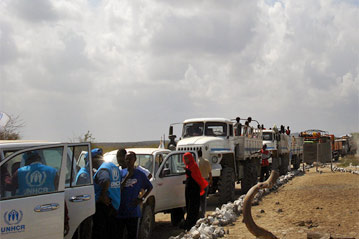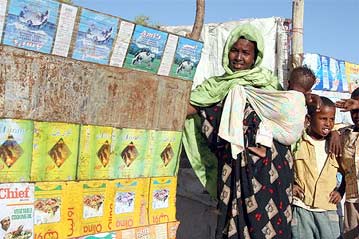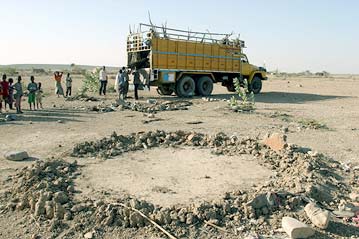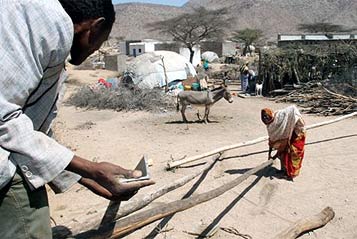Djibouti: Final phase of repatriation to Somaliland starts
Djibouti: Final phase of repatriation to Somaliland starts
This morning, Tuesday, we started the final phase of our voluntary repatriation programme to help some 1,800 Somali refugees return home to Somaliland, in north-west Somalia, from Djibouti by the end of the year. Today's convoy of 13 trucks, hired by UNHCR, is transporting 210 Somaliland refugees from Ali Addeh camp, located 120 km from Djibouti city, to the Djibouti-Somaliland border at Loyado border crossing, some 130 km from the camp.
The 1,800 refugees are one of the last groups of Somaliland refugees living in Djibouti. Many of the returnees fled to Djibouti more than 16 years ago after the collapse of the Siad Barre regime in 1991 and ensuing civil war in Somalia.
The return programme from Djibouti to Somaliland was suspended in March 2006 to allow for the electronic registration of all refugees in Djibouti. When the suspension took place the four-year old repatriation operation, which started in July 2002, had helped some 19,400 Somali refugees return home.
Today's convoy will head to a transit centre set up in Zeila town, Awdal Region in Somaliland, 27 km from the border. Returnees will spend Tuesday night at the transit centre where they will receive a return package before continuing their journey Wednesday to their homes.
As part of the return package, each returnee will be given the first of three instalments of a nine-month food package provided by the UN World Food Programme. The food package is designed to support returnees during the initial months of their reintegration. UNHCR will also provide some household goods to families including kitchen sets, blankets, sleeping mats, jerry cans for water storage and plastic sheeting for protection of their shelters. In addition, returnees will receive some cash to help them pay for transportation from the various drop-off points, mainly in towns, to their home villages.
The majority of the refugees in Djibouti will return to the Awdal Region, where UNHCR and other partners have set up a wide variety of reintegration projects ranging from water, education, income generation, road infrastructure, health and security. These projects have already supported the integration of thousands of returnees from Djibouti and Ethiopia.
Since July 2002, when the first group of refugees was assisted home from Djibouti to Somaliland, the UN refugee agency has been promoting repatriation to Somaliland. UNHCR-sponsored "go and see" visits allowed refugees to assess for themselves conditions back home, and spread the word around the Djibouti camps.
Between February 1997 and March 2006, an estimated 300,000 Somaliland refugees have returned home from Ethiopia and Djibouti using their own means as well as through UNHCR's assisted voluntary repatriation. Djibouti currently hosts nearly 7,000 refugees mainly living in the Ali Addeh camp. Some 2,800 of these refugees are from Somaliland while more than 3,500 others are from south and central Somalia. There are also small numbers of refugees from Eritrea and Ethiopia.






